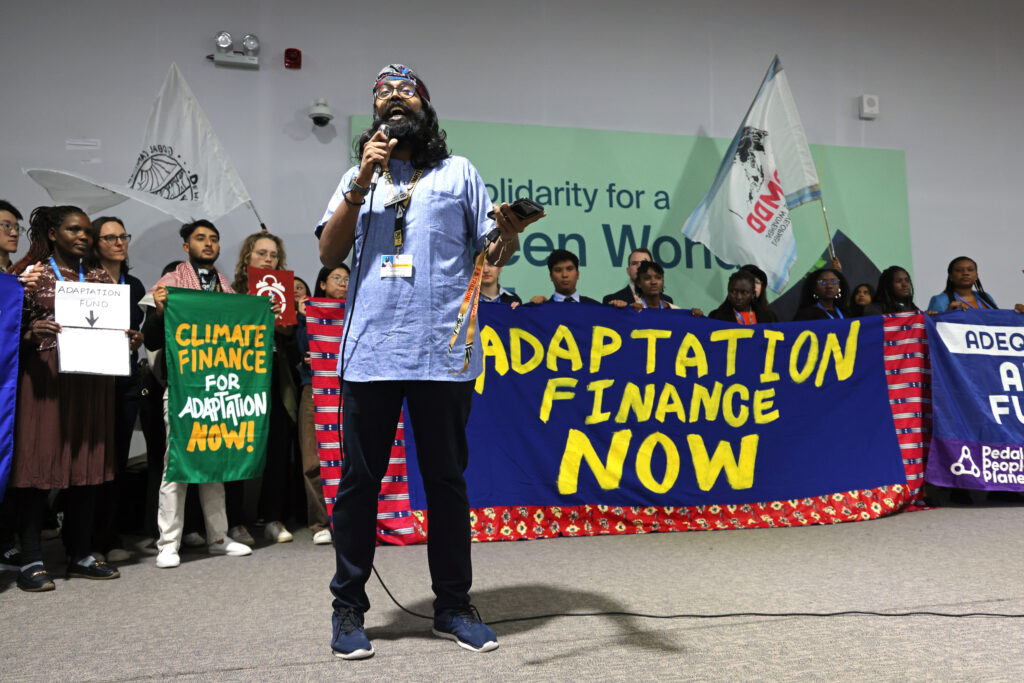
Les pays se disputent qui obtient de l’argent, qui paiera et si l’allégement de la dette fera partie du colis.
BAKU, Azerbaijan—With little to show after eight days of talks, COP29 negotiators are under pressure to deliver a solid finance deal to help the countries most affected by climate change and least responsible for it before the annual climate conference is scheduled to end on Friday.
Previous agreements reached under the United Nations Framework Convention on Climate Change obligate developed countries to increase funding to developing countries to help speed a transition to renewable energy and adapt to deadly and expensive impacts from heat waves, floods, drought and wildfires. Whether the larger funding package will be linked with money for a separate loss and damage fund is still at issue in the ongoing negotiations.
Current climate funding amounts to about $120 billion per year, far short of the need. Now, developing countries say it’s time to ramp up that spending to $1.3 trillion per year by 2030. But so far at COP29, rich countries that have caused most of the climate damage are relying on “accounting tricks” rather than talking about real increases, said Michai Robertson, who is monitoring the climate finance discussions for the Alliance of Small Island States.
“It’s kind of depressing, in reality, that we are playing around with exercises … and using institutions that don’t have transparent methodologies,” Robertson said immediately after a Tuesday negotiating session. “So there’s a lot of issues that we have as AOSIS with them doing this kind of sleight of hand with accounting.”
Get Inside Clean Energy
Today’s Climate
Twice-a-week
A digest of the most pressing climate-related news, released every Tuesday and Friday.
Get Today’s Climate
Breaking News
Daily
Don’t miss a beat. Get a daily email of our original, groundbreaking stories written by our national network of award-winning reporters.
Get Breaking News
The debate boils down to questions about which countries should be on the giving and receiving ends of the money flows, whether the financing comes in the form of loans or grants and what the total should be. Developing countries are also pushing for debt relief because some of them have already been driven almost to bankruptcy trying to recover from the damages that global warming has already caused.
Developed countries in the delicate talks aren’t saying anything about the structure of the financing, but in the past, much of the money has come in the form of loans with stringent conditions.
The last two COP meetings both went into overtime. In 2022, the loss and damage discussions were slowed by developed countries. Last year, big oil producers, especially Saudi Arabia, tried to block any mention of phasing out fossil fuels, then reluctantly agreed to weak language about that transition without specifics.
Will Rich Countries Step Up?
Without addressing specifics, German Foreign Minister Annalena Baerbock said Wednesday that future generations will be asking, “‘Did you do everything you could, everything to make sure our planet will not be torn apart by conflicts over scarce land, food, water?’ The answer is in the here and now, in the days that we have left here at COP29.”
She said a new chapter on climate finance is achievable if developed countries take up their responsibilities. With the United States expected to pull out of the Paris climate agreement under the second Trump administration, as it did during the first, Germany is seen by many as a country in a key leadership role on the climate crisis.
“Germany remains committed to its promises,” she said. “We will do our part. But everyone needs to take responsibility, transparently and particularly according to their economic strength in the here and now.”
And she said countries need to leave behind the concepts of the 1990s, like relying only on public funds for climate finance, because they don’t address the needs of today. She advocated for private sector involvement in climate finance, as well as “simpler procedures to make climate finance accessible for those in need.”
The European Union has not made public any specific figure for climate finance, but it is pushing high-emitting countries with emerging economies like China and Saudi Arabia to contribute to the package, said Lídia Pereira, co-chair of a European Union Parliamentary delegation at the talks.
Robertson said that small island states and other developing countries have been under immense pressure to drop the $1.3 trillion figure as a floor for a new climate financing deal.
A big increase in climate spending “was promised to us in the Paris Agreement. It was promised to us by the international community,” he said, “so it’s really disheartening to see that there’s a lack of solidarity.”
In addition to the dollar figure, developing countries are pushing for climate funds to be easily accessible, without lots of strings attached.
Under the current climate finance structure, developed countries often tell recipients exactly how the money needs to be spent, instead of looking at what they need, said Harjeet Singh, a campaigner with the Fossil Fuel Non-Proliferation Treaty who previously worked on getting the loss and damage fund set up.
“We’re basically flying in the dark, and we’re supposed to finish this COP two days from now.”
In some cases, particularly with climate finance from the U.S., the requirements include specifying which companies the recipients have to use to buy equipment or supplies. The conditions can also include that any technical support must come from the country providing the funds, so a lot of money in the process goes right back to the country providing it, he said.
Robertson said the arrival of ministerial-level delegates on Monday hasn’t resulted in much progress. The recent U.S. election further complicates the finance talks: Climate financing increased under President Joe Biden, while President-elect Donald Trump has called climate change a “hoax” and vowed to expand the oil and gas drilling that drives much of the damage now unfolding.
“We’re basically flying in the dark, and we’re supposed to finish this COP two days from now,” Robertson said. “I do think … it’s really sad that one country, because of its system, can decide multiple times when to leave the Paris Agreement and come back into it.”
That, he said, is “something for the U.S. population and the electorate to reckon with. I hear everybody talking about, ‘Oh yes, we’ll continue doing it on the state level, the municipal level, but we need to see leadership from the top. This in-and-out kind of behavior is not helpful to ambition.”
Fielding a question about climate finance in the context of recent catastrophic flooding in parts of the Caribbean region, Robertson said developing countries feel abandoned because developed countries don’t want to talk about loss and damage in the context of the larger climate funding package.
Loss and damage funds are intended to compensate for the often irreplaceable destruction of property, while the larger climate finance package being discussed at COP29 is mainly about funding sustainable development and adaptation measures that could prevent future damages.
If the fundamental structure of climate finance isn’t changed, he said it means more countries will incur unsustainable debt that will “not only affect the current generations in those countries, but future generations.”
About This Story
Perhaps you noticed: This story, like all the news we publish, is free to read. That’s because Inside Climate News is a 501c3 nonprofit organization. We do not charge a subscription fee, lock our news behind a paywall, or clutter our website with ads. We make our news on climate and the environment freely available to you and anyone who wants it.
That’s not all. We also share our news for free with scores of other media organizations around the country. Many of them can’t afford to do environmental journalism of their own. We’ve built bureaus from coast to coast to report local stories, collaborate with local newsrooms and co-publish articles so that this vital work is shared as widely as possible.
Two of us launched ICN in 2007. Six years later we earned a Pulitzer Prize for National Reporting, and now we run the oldest and largest dedicated climate newsroom in the nation. We tell the story in all its complexity. We hold polluters accountable. We expose environmental injustice. We debunk misinformation. We scrutinize solutions and inspire action.
Donations from readers like you fund every aspect of what we do. If you don’t already, will you support our ongoing work, our reporting on the biggest crisis facing our planet, and help us reach even more readers in more places?
Please take a moment to make a tax-deductible donation. Every one of them makes a difference.
Thank you,




